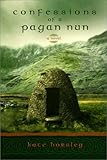 Kate Horsley’s Confessions of a Pagan Nun has been on my to-read list for at least a couple of years, and I finally decided to take it off the shelf and read it. Serendipitously, I discovered the Historical Fiction Challenge and was able to use this book as part of the challenge.
Kate Horsley’s Confessions of a Pagan Nun has been on my to-read list for at least a couple of years, and I finally decided to take it off the shelf and read it. Serendipitously, I discovered the Historical Fiction Challenge and was able to use this book as part of the challenge.
For those of you who may have read The Virgin Blue by Tracy Chevalier (review here) or The Mists of Avalon by Marion Zimmer Bradley, the premise of this novel is not new. Confessions of a Pagan Nun is told from the viewpoint of a woman a the crossroads in history: she is born into a pagan culture and watches, reporting her observations, as Christianity gradually subsumes paganism and druidism. Gwynneve, the narrator, longed to learn to read and become a druid as a child. She tells her story from the monastery of St. Brigit, where a confluence of strange events leads to wild accusations against her.
This book is different from The Virgin Blue and The Mists of Avalon because Gwynneve sees wisdom and beauty in both Christianity and paganism; she also sees violence and ignorance in both, and boldly reports what she sees. I was reminded that while history is written by the victors, the truth usually reveals itself, and words have the power to transmit the truth when we have nothing else. It was refreshing to read a book about the conflict between paganism and Christianity that casts neither as evil in and of themselves, but lay bare that men have used both to their own ends for the worse.
Confessions of a Pagan Nun is a quick, enjoyable read. In terms of historical fiction, I saw no inaccuracies that I could tell, having studied this time period — 6th century British Isles — quite a bit. I certainly think that should one be interested in learning about life in 6th century Ireland, this book would not disappoint.
One of these days, I need to re-read The Mists of Avalon. It’s one of my all-time favorite books. My next book for the Historical Fiction Challenge is Nothing Like the Sun by Anthony Burgess (yes, author of A Clockwork Orange). This book is about Shakespeare’s love life, a topic which never fails to inspire much speculation and not a few pretty good stories.
